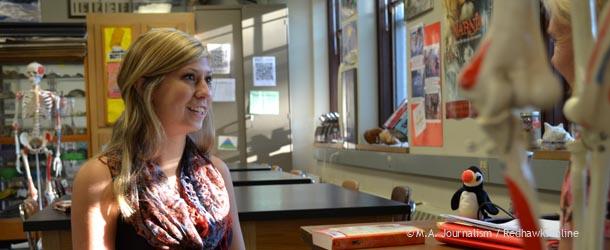“It’s vital that students imagine, wonder, daydream, are bored, solve problems and all of that,” said English teacher Katherine Myers. “If I could assign that as a summer assignment, I would.”
Summer homework has been a part of nearly every high school student’s education, but whether or not it should be assigned and what should be assigned are issues that many teachers deal with every year. This past summer, 13 Minnehaha courses out of around 75 courses had summer assignments, all English and Honors/AP classes. Many educational researchers argue that summer homework wards off learning loss.
It has been shown in studies such as the 1996 study conducted by Harris Cooper, now a professor of education at Duke University. The study documented a loss of learning and drop in test scores over the summer break. However, not everyone is convinced that summer homework is the solution.
“Even if there is a summer slide, I don’t think homework is the solution,” said Sara Bennett, founder of StopHomework.com, to Great Schools, an online information site for parents concerning schools and educational news. “Kids don’t have enough downtime during the school year. I think they need that freshness during summer.”
Junior Lilly Thomey agrees that relaxation is important.
“I want that break,” said Thomey. “I feel like school is so intense when we get [back] into it.”
Still, Thomey recognizes the importance of a good attitude going into summer homework.
“It frustrates me because I get summer homework and I try to set goals for myself over the summer, but it turns out that I wait until the last week before school and rush it and I don’t really care about the material,” said Thomey. “If I didn’t have such a negative attitude toward summer homework, I would’ve gotten it done and it wouldn’t have been such a problem. It’s just the resentment of school coming up and having to go back and do things.”
While AP United States History teacher Matthew Ridenour knows that students tend to put these assignments off until shortly before school begins, he doesn’t believe that this should be the deciding factor in whether or not homework should be assigned, but instead, it should be based on the effectiveness of the assignment.
“I don’t believe that teachers should make decisions based on the habits of students, so I wouldn’t say that summer homework should not be assigned simply because students are unlikely to do it in a timely way,” said Ridenour. “I did not assign summer homework this year because I have for the past five years and I don’t have anything against which to measure the success of [it]. To me, teachers need to ask if what they’re doing is working, and the only way I’ll know that is if I don’t do it once and see what happens.”
As shown by Ridenour’s decision to take a year off from assigning summer homework, Minnehaha teachers are not required to give any summer work.
“I’ve never asked a teacher to give a summer assignment,” said Vice Principal Mike DiNardo. “It’s all based on their opinion. If teachers feel like its valuable, then thats great but theres no pressure to say we need to give summer homework to our students.”
Still, DiNardo supports the decision to assign summer reading.
“It’s good that we’re giving summer reading assignments, so that everyone’s reading a book,” said DiNardo. “It gets their minds into [learning] in some way.”
Beyond keeping in the mindset of school, Myers sees summer assignments, especially summer reading, as a way to contribute to the summer experience. For Myers’ AP English 11 class, she assigned A Prayer for Owen Meany, a text that “was carefully chosen for multiple reasons.” On the other hand, her regular English 11 class and her English 9 classes in the past were given a choice of books which “opened up the opportunity to find something that you’d like to read.”
“If we view reading as work,” said Myers, “If we view using our imagination to enter another world or [learning] about another person, another culture, another place [as work], then we don’t understand education. These texts are intended to open our eyes and our view of another person. How can we love other people if we’re so inside ourselves? I would hate for reading to just be work, and it that’s what it is, we need to work to make reading a way to experience life.”
And so, Myers works to make summer reading assignments do just that.
“Imagination and rest are critical to summer,” said Myers. “Hopefully those reading choices are strong enough to spark imagination.”

